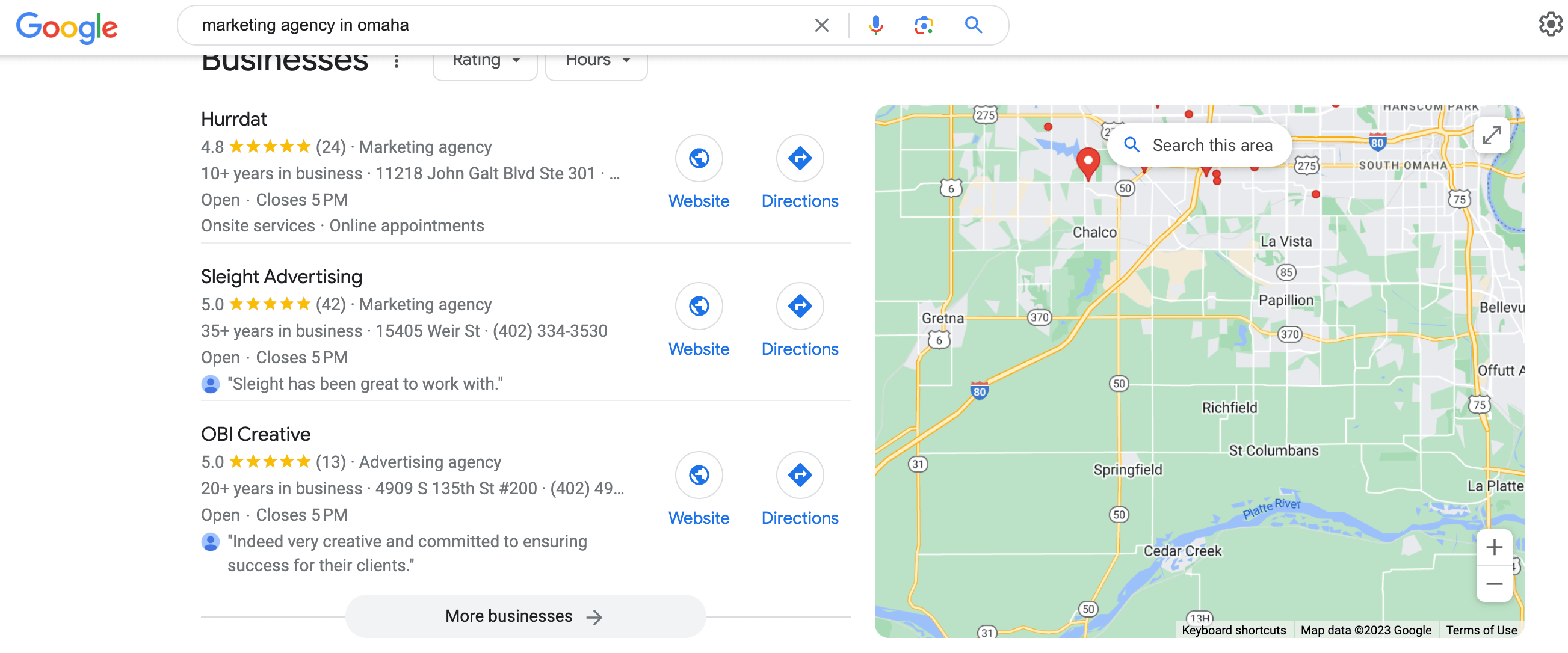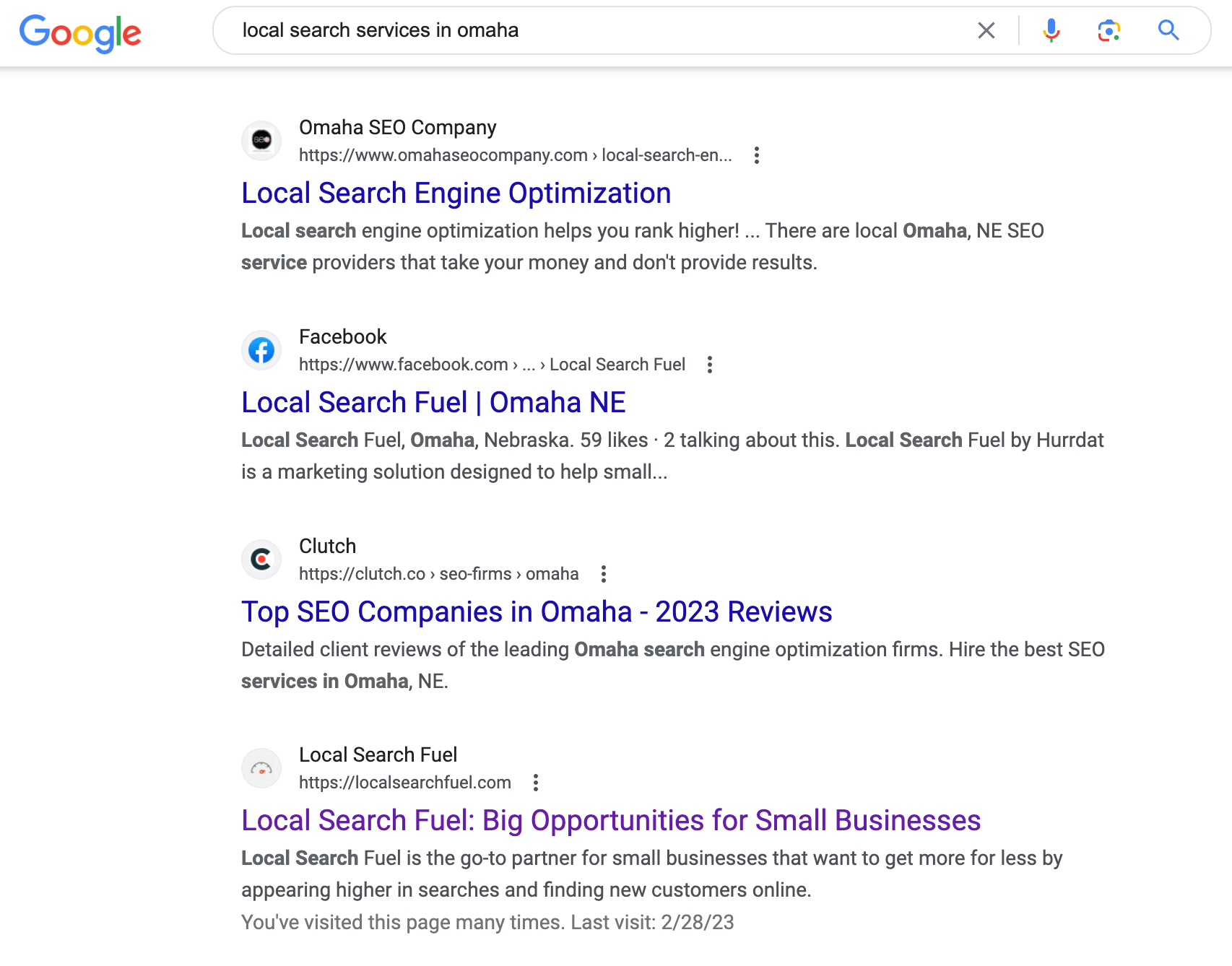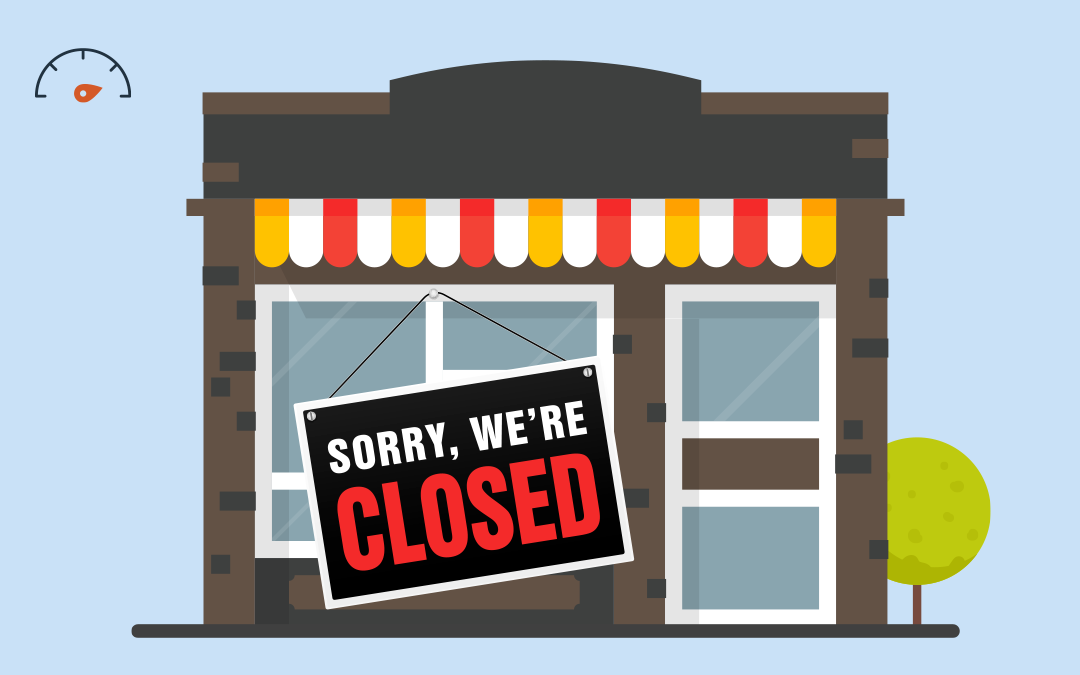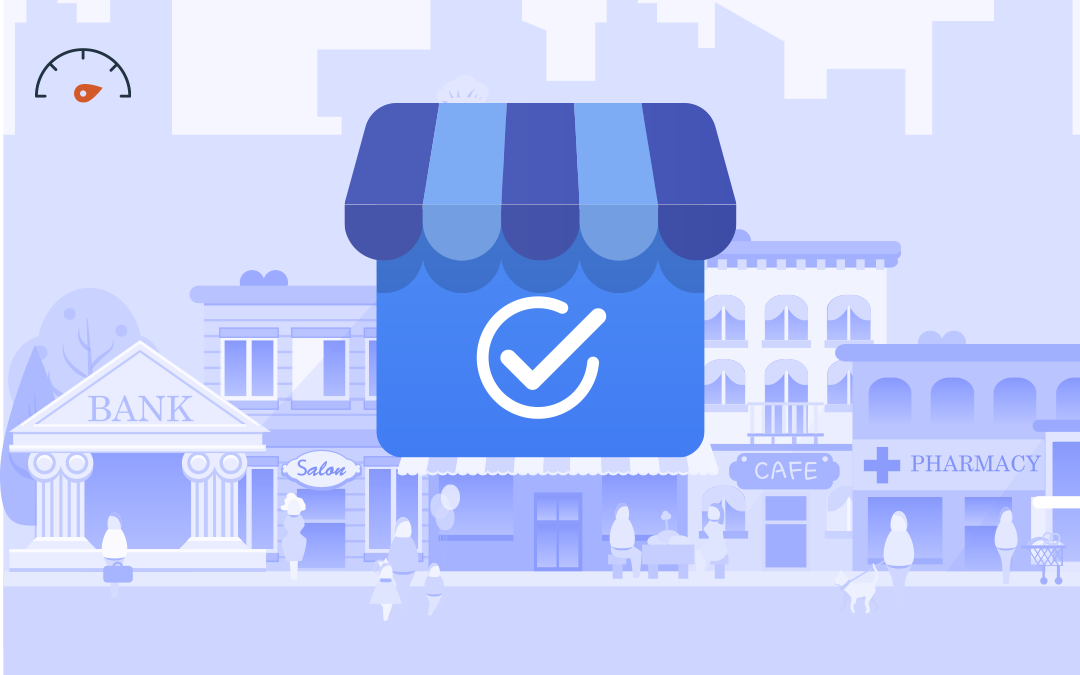Search algorithms are constantly changing, and for local businesses trying to get found by customers, it’s important to adjust your local search strategy to continue showing up in results. Here’s our collection of the most important local search factors that’ll impact your ranking this year.
- Local Pack Ranking vs. Local Organic Ranking
- Local Search Ranking Factors in 2023
- Local Search Ranking Factor Changes
Local Pack Ranking vs. Local Organic Ranking
When it comes to local search rankings, it’s important to know the difference between the local pack and local organic search results. Each follows slightly unique ranking factors, so you’ll need to optimize your online presence differently to do well in each.
Local Pack Ranking Factors

The local pack, also called the Google Map Pack or Google 3-Pack, is a module at the top of Google search results pages that includes the three most relevant and helpful Google Business Profiles (formerly Google My Business) for a user’s intent. Local pack results show up above organic search results.
When local search experts were asked which signals they thought Google cared most about when deciding the local pack, here’s how they answered:
- Google Business Profile signals (32%)
- On-page signals (19%)
- Review signals (16%)
- Backlink/Inbound link signals (11%)
- Behavioral signals (8%)
- Local citation signals (7%)
- Personalization (6%)
Local Organic Search Ranking Factors

Local organic search results are the standard web results that show up below the Google Map Pack. This would likely be where your business website, local business directories, and competitor websites appear.
Local search experts also ranked which signals they saw Google rewarding most in local organic searches. These are the results:
- On-page signals (36%)
- Backlink/Inbound link signals (26%)
- Behavioral signals (9%)
- Google Business Profile signals (9%)
- Personalization (7%)
- Local citation signals (7%)
- Review signals (6%)
Local Search Ranking Factors in 2023
Search engines always want to match consumers with the best solution to their search query, but Google needs a way to determine which results are the “best.” So, Google ranks results by relevance, quality, usability, and context.
Factors like reviews, proximity to the searcher, Google Business Profile, and on-page signals all inform the search engine that your business is relevant, high quality, and otherwise correctly fits people’s needs. Here are the seven signals your business can focus on in 2023 to be more competitive in local search.
Google Business Profile Signals
Google Map Pack pulls its information from Google Business Profile, so your details in this local business listing matter a lot to the search engine. Most important, according to local search experts, are the following Google Business Profile details:
- Primary and secondary business categories
- Keywords in business title
- Physical location in city of search
- Proximity to searcher
Business categories are first to tell Google the purpose of your business, like “marketing agency” or “restaurant,” while a keyword-optimized business title, like a brand name followed by “Chiropractic & Wellness Center,” helps make your business’ purpose and relevance clearer. Finally, your address confirms that your business is truly local—with a location or service area close enough to the searcher.
Getting on top of these local ranking factors requires accurate, updated, and precise NAP (name, address, and phone number) data for all of your locations, a comprehensive list of primary and secondary business categories, and a well-optimized business title.
On-page Signals
As Google crawls and indexes your business’ website, it’s trying to understand and properly file your information away, so that it can later serve up your website in relevant local searches. Google rewards a variety of on-page factors that facilitate this understanding, like:
- Keyword-optimized website content, titles, and headers (H1, H2, etc., HTML tags)
- Keyword-optimized landing pages
- Individual service pages
- Relevance of hyperlocal keywords
- Relevance of product or service keywords
- Volume and quality of content
Site-wide keywords help Google understand the context of your business and its services. You’re teaching the search engine when it should and should not show you in local results.
For example, if you’re a plumber who works on sink drains and water heaters, but not gas piping, you’d want to use keywords like “sink plumbing” and “hot water heater repair,” but not “gas line plumber” or other variations. This stops Google from serving up your business in irrelevant searches for gas plumbers.
In the same way, hyperlocal keywords like “plumber in Chicago,” “gas station on I-80,” or “gym near Duke University” defines your location/service area to keep your business out of searches that aren’t near you.
By having a page for each of your services, you’re creating another opportunity to keyword-optimize and rank in local search results. Your service pages also give Google a better understanding of the finer details and scope of your business.
The final major on-page signal is volume of quality content. Amount of copy alone doesn’t impact your local search ranking. Google cares just as much about the quality, so your business is better off producing original, unique, updated, and relevant work on a consistent schedule.
Backlink & Inbound Link Signals
Having a quality backlink profile helps build your website’s domain authority, a signal of credibility to search engines. When Google is determining if your business has quality backlinks, here’s what it looks at:
- Authority of inbound links
- Diversity of inbound links
- Quantity of inbound links
- Keywords in backlink anchor text
Inbound links are like votes of confidence for your site, so it matters to Google who these votes come from. Say you’re a local pharmacy, and two different sites link to your prescription pick-up page. One site is a local doctor’s office that ranks high in search, and the other is a parent’s blog that’s not optimized. The link from the doctor’s office is considered the better quality backlink because it’s more locally relevant and has more authority. But both are important since you want a variety of sources pointing Google your way.
Anchor text matters to Google, too. If your prescription pick-up page is linked under “quick prescription pick-up” on one source, while another is linked under a more general term like “pharmaceutical services,” the first is more valuable for your local search ranking because it better matches the topic of your linked page.
To send better backlink signals to search engines, there are times when your business can request backlinks from other websites, but ultimately building backlinks happens when you create valuable content that other people want to use.
Consumer Behavior & Experience Signals
Google wants people to have a positive experience on your business’ website or Google Business Profile, which is why the search engine tracks consumer behavior signals and website performance like:
- Bounce rate
- Click-through rate
- Dwell time
- Mobile-friendliness
- Page load speeds
If your site won’t load quickly or errors out, a user might go back to search results and choose one of your competitors to get a faster solution to their problem. This raises your bounce rate and lowers dwell time, which tips Google off that people aren’t getting what they need from your business.
Another common reason your consumer behavior signals could be low is because your content is thin. If you don’t quickly and fully answer searchers’ questions, they’re likely to go elsewhere and you’ll suffer the same results.
Similarly, if you’ve optimized for irrelevant keywords or business categories that cause you to appear in search terms that don’t relate to your services or locations, people probably aren’t going to click on your citations, which will eventually lower your ranking in those results because you’re not the right choice for that intent.
To avoid negatively impacting your local search ranking because of consumer behavior signals, your business will want to build content that targets the right search terms and create a well-optimized, mobile-friendly website.
Local Citation Signals
Google prefers to send accurate information to searchers, so it will cross-reference your NAP data on local directories like Yelp, TripAdvisor, FourSquare, Apple Maps, and Bing Maps with your Google Business Profile and your website’s location pages. If there are any discrepancies between listings, it could negatively impact your ranking. In other words, your business should care about these factors:
- Consistency of local citations
- Quantity of local citations
Citations can also expand to any mention of your business listing in the news, in blog posts, or on industry sites. More than likely, these sources will draw citation data from your Google Business Profile, website, or one of the other local citations mentioned above, so it’s important to claim and update your business listings regularly.
Review Signals
Google cares about reviews when ranking your business in the local pack because they offer social proof that consumers have used your business and a majority had a good experience. All of these factor into creating a strong review profile:
- Quantity of Google reviews
- Quality of reviews (star rating)
- Frequency of reviews over time
- Recency of reviews
If Google sees that customers are leaving a lot of reviews with positive sentiment, it indicates that the business is helpful and will continue to be a good option for other people.
If customers steadily leave reviews on your business over time, rather than getting an influx of reviews all at once, it tells Google your business is functioning healthily and legitimately. A sudden surge of 5-star reviews could be seen as suspicious by the search engine and could damage your business’ reputation if customers believe them to be fake reviews.
On the other hand, if your business stops receiving reviews for a long period of time, it may indicate to Google that your business is no longer relevant.
Google also knows that you can’t always get a perfect 5-star rating. In fact, people would rather you not. By having a few negative reviews, you’re seen as more legitimate and able to prove how you make customer problems right when you respond to negative comments. To send positive review signals to search engines, you’ll want to focus on getting more high-quality Google reviews.
Personalization
Of the 200+ local search ranking factors, personalization easily is voted among the top 10 signals for both local pack and organic search. To improve everyone’s search experience, Google tailors local search results to individual consumers based on collective search data. Here are the most important data points the search engine uses to customize its search results:
- Consumer search history
- Consumer search location
- Device used to search
If a consumer has searched your business name frequently in the past or visited your webpages, you’re more likely to show up again in their related searches.
When a user is standing right outside your business and does a “near me” search, your business is more likely to show up because of their location.
And if a consumer is searching from a mobile device like a phone or tablet, Google is more likely to give them the mobile-friendly version of websites, if one exists.
Businesses don’t have much control over personalized searches. Besides the many steps previously outlined in this post, your company can create localized blog posts and geo-targeted ads and regularly monitor your performance online to enhance visibility in personalized local search results.
Local Search Ranking Factor Changes
The following local search ranking factor groups have increased in perceived importance over the past few years:
- Behavioral signals
- On-page signals
- Personalization
The following local search ranking factor groups have decreased in importance over the past few years:
- GBP signals
- Linking signals
- Review signals
The following local search ranking factor groups have maintained the same importance:
- Local citation signals
Local search experts have been focusing on creating quality content in all ways possible this year—including strong internal linking strategies between pages and having individual service and location pages. This could explain why on-page and behavior signals are favored more heavily by Google in 2023.
Google’s 2021 Vicinity update limited the area where businesses can rank. This is likely the main reason for the drop in importance of Google Business Profile signals. You can’t change your business’ physical locations, but you can optimize your business listing to prompt consumer interaction, which also transfers more importance to behavioral signals.
“On-page signals like optimizing your website and creating relevant content will continue to increase in importance over the next five years, while spam fighting is likely going to decrease. Google doesn’t always do a good job of following its own guidelines, so flagging spam is sometimes ineffective. Business owners have to decide if investing time in spam fighting is worth it.” – Alexi Wilt, Local Search Director
While review and linking signals are still important, they’re a bit uncontrollable, resulting in their decrease in ranking power. Plus, many of the factors beneath these signals like domain authority, keywords in reviews, and responding to reviews aren’t direct ranking factors.
Looking for ways to improve your local search ranking and get more traffic? Local Search Fuel by Hurrdat has local SEO optimization services available to get discovered by more customers. Get started today!
Data from Whitespark’s Local Search Ranking Factor Study

Stefanie Vanderbeek
Stefanie Vanderbeek is a content strategist and writer who specializes in long-form digital content and website SEO optimization. Stefanie earned her Bachelor of Journalism from the University of Nebraska-Lincoln in Advertising and Public Relations in 2021. In her free time, you can find Stefanie reading, deep diving into video game lore, singing in her professional vocal group, or traveling the world!



